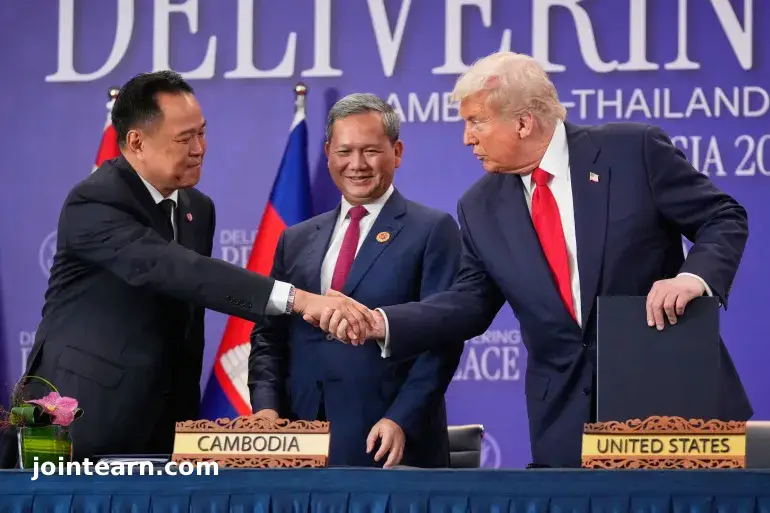
US President Donald Trump launches Asia tour with major diplomatic and trade breakthroughs, signaling renewed US influence in Southeast Asia.
Kuala Lumpur, Malaysia — A Landmark ASEAN Moment
In a defining moment for Southeast Asian diplomacy, United States President Donald Trump presided over the signing of a ceasefire agreement between Thailand and Cambodia on the sidelines of the ASEAN Summit 2025 in Kuala Lumpur. The pact, hailed as a “historic milestone,” marks a significant step toward ending decades of border tensions between the two nations.
The agreement was co-signed by Trump, Thai Prime Minister Anutin Charnvirakul, Cambodian Prime Minister Hun Manet, and Malaysian Prime Minister Anwar Ibrahim, symbolizing a regional push for stability.
“This is something that many thought could never be done,” Trump declared during the ceremony. “Peace in Southeast Asia is good for the world, and this agreement represents courage, leadership, and cooperation.”
Regional Leaders Applaud the Ceasefire
Prime Minister Anutin described the deal as “the building blocks for lasting peace,” while Hun Manet called it “a historic day for Cambodia and Thailand.” Malaysian Prime Minister Anwar Ibrahim added, “Reconciliation is not a concession — it’s an act of courage that strengthens our region.”
The ceasefire builds on a truce brokered in July 2025 following five days of intense border fighting that killed at least 43 people and displaced hundreds of thousands. Under the new pact:
- Thailand will release 18 captured Cambodian soldiers.
- Both sides will remove heavy weapons and landmines from contested zones.
- Malaysian peacekeeping troops will monitor the ceasefire and ensure compliance.
Decades of Border Disputes Near an End
The Thailand-Cambodia border, stretching nearly 800km (500 miles), has long been a source of conflict. The most contentious area — home to ancient Angkor-era temples and rich natural resources — has been the site of recurring skirmishes since the early 20th century, rooted in a vaguely worded 1907 French colonial treaty.
The latest conflict erupted earlier this year near Laos and the Preah Vihear temple region. Trump’s diplomatic pressure, including the threat of tariffs, pushed both countries to halt fighting and pursue talks.
Trump’s Trade Diplomacy Expands Regional Ties
Alongside the peace deal, Trump announced major trade agreements with Thailand, Cambodia, and Malaysia. These include:
- Thailand’s commitment to purchase $2.6 billion in US farm goods and $18.8 billion in aircraft.
- Cambodia’s partnership with Boeing to develop its aviation ecosystem.
- Malaysia’s pledge to buy $3.4 billion in liquefied natural gas and invest $70 billion in the US economy.
“These deals represent a new era of trade cooperation and mutual benefit,” Trump said, emphasizing his “America First, Asia Strong” approach.
Critics Question Longevity of the Ceasefire
Despite the optimism, experts remain cautious.
Sebastian Strangio, author of Cambodia: From Pol Pot to Hun Sen and Beyond, noted:
“The ceasefire is a positive gesture, but it doesn’t address the root issue — the disputed border demarcation. It’s more political theater than a permanent solution.”
Similarly, Al Jazeera’s Tony Cheng, reporting from Thailand’s Sa Kaeo province, said that while the agreement reinforces existing promises, locals remain wary. “The Thai public views this as the beginning of the end of the conflict — not the end itself,” he said.
ASEAN and Global Implications
The ceasefire highlights Trump’s renewed engagement in Asia and could reshape ASEAN’s geopolitical dynamics. However, some analysts warn that his bilateral trade deals with individual ASEAN members may undermine regional unity.
Economist Shiro Armstrong from the Australian National University commented:
“These deals could weaken ASEAN’s collective bargaining position. They deliver quick political wins but risk eroding the principle of equal treatment among member states.”
Still, the peace pact is seen as a diplomatic victory for Trump ahead of his upcoming face-to-face meeting with Chinese President Xi Jinping in South Korea, marking their first encounter since 2019.
A Fragile Peace with Global Stakes
On the ground, Thai forces continue clearing landmines while villagers near Sisaket and Kantharalak provinces construct new bomb shelters — a reminder that peace remains fragile. Yet, optimism lingers that this could be the start of a lasting resolution to one of Southeast Asia’s most persistent conflicts.
As Trump’s six-day Asia tour continues, with stops in Japan and South Korea, the world watches to see whether this bold diplomatic move signals a genuine pivot toward sustained peace and prosperity in the Indo-Pacific.


Leave a Reply